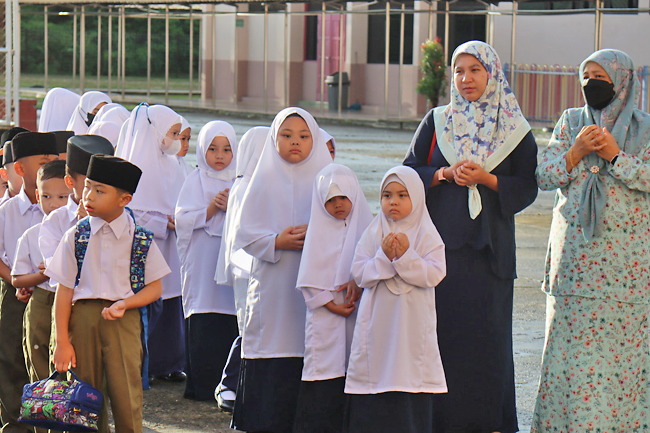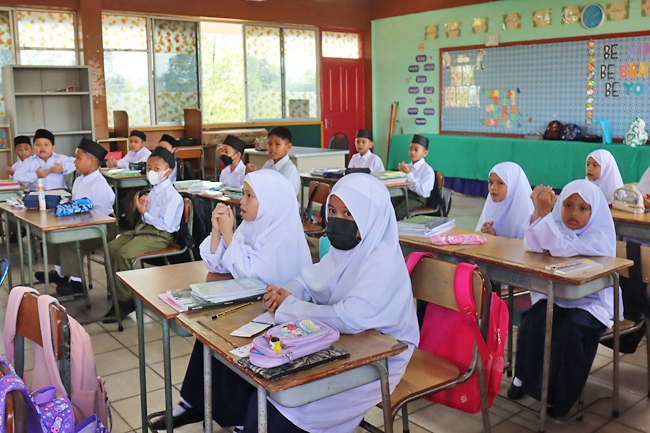Brought to you by

As the nation advances in education, embracing emerging innovations and technology, the Sultanate continues to place a strong emphasis on Islamic education.
This ensures that this vital aspect remains robust, aligning with the national philosophy of Malay Islamic Monarchy (MIB).
In recent years, the Islamic Studies Department (JPI) has implemented significant measures to enhance Islamic education. These efforts align with the goals of the Ministry of Religious Affairs’ (MoRA) Strategic Plan 2020-2024, which emphasises the advancement of Arabic and religious education.
ENHANCING THE STANDARDS OF EDUCATORS AND EDUCATIONAL INSTITUTIONS
To maintain high teaching standards, the JPI regularly assesses educators through its Inspectorate Division.
Following these evaluations, the At-Tarqiah Programme offers targeted support to teachers in need of improvement, while the At-Tatweer Programme provides comprehensive training for all educators.
These sessions cover areas such as teaching methods, leadership, motivation, ICT skills and Al-Quran studies. By equipping teachers with essential skills, the department ensures they can effectively adapt to evolving educational requirements.
The JPI also prioritises the quality of Arabic and religious schools, conducting evaluations based on established criteria.
Improvements are then made through initiatives such as the An-Najah Programme and the 3K Programme. These initiatives aim to foster a supportive and conducive learning environment for both students and teachers. Student performance in public examinations, such as the Religious Primary Schools Education Certificate (SSSRU), Primary School Assessment (PSR), Brunei Religious Education Certificate (SPUB), ‘O’ Level and ‘A’ Level, is another focal point for the department.
Programmes like Itqaan and Takreem are implemented to improve exam results, while parental involvement and attendance monitoring play essential roles in student success.
The department continues to support students through a variety of initiatives, ensuring that they are well-prepared for the challenges of modern education.


ADVANCING CURRICULUM, LANGUAGE AND ISLAMIC PRACTICES IN EDUCATION
JPI has made significant strides in updating the curriculum across primary, secondary, and pre-university religious education levels.
These curriculum updates address contemporary educational needs while preserving the integrity of Islamic teachings.
A key focus has been on strengthening Arabic language through initiatives like the Hayya Ilal Arabiah programme, which enhances communication skills in Arabic via extracurricular activities.
Collaborations with local and international educational institutions further enrich the Arabic curriculum, ensuring students receive comprehensive and well-rounded language training.
Al-Quran education remains a cornerstone of Islamic studies in Brunei. Therefore, to enhance proficiency in Al-Quran recitation for both students and teachers, the JPI has introduced innovative learning systems tailored to individual abilities. Programmes like One Week One Juzuk (1M1J) and One Month One Iqra (1B1I) foster a deeper connection with Al-Quran, ensuring students not only learn to recite but also develop a lifelong bond with the holy text.
Established in 1997, the Youth Al-Quran Reading Scheme (STAR) offers advanced Al-Quran training for students aged 12 and above, nurturing future generations of skilled qaris and qariahs.
Teachers, too, benefit from continuous professional development, ensuring they remain effective guides in Al-Quran education.
Additionally, to cultivate discipline and responsibility in performing obligatory prayers, students are required to document their daily prayers in a dedicated Prayer Record Book, promoting accountability while involving parents and schools in the process.
The Muqim ash-Shalah Programme further refines students’ understanding and practice of daily prayers, providing additional support to those needing further guidance.
This integrated approach strengthens religious practice as an essential part of students’ daily lives.
ISLAMIC EDUCATION AS A WAY OF LIFE
The impact of structured efforts in Islamic education is profoundly evident throughout Brunei’s society.
His Majesty Sultan Haji Hassanal Bolkiah Mu’izzaddin Waddaulah ibni Al-Marhum Sultan Haji Omar ‘Ali Saifuddien Sa’adul Khairi Waddien, Sultan and Yang Di-Pertuan of Brunei Darussalam envisions a nation where Bruneians wholeheartedly embrace Islam as a complete way of life.
And the foundations of religious education established by His Majesty’s late father, Al-Marhum Sultan Haji Omar ‘Ali Saifuddien Sa’adul Khairi Waddien ibni Al-Marhum Sultan Muhammad Jamalul Alam, have cultivated a generation deeply rooted in Islamic values, ensuring that every aspect of daily life in Brunei aligns with these principles.
As such, Islamic education plays a vital role in upholding the integrity of religious beliefs in the country.
Through ongoing professional development and regular assessments, religious teachers are well-prepared to navigate the challenges of a rapidly changing world.
These initiatives ensure that Islamic education not only preserves tradition but also adapts to contemporary developments, contributing to the nation’s vision for the future, Brunei Vision 2035.
The JPI remains at the forefront of fostering a strong Islamic education system in Brunei.
By focusing on improving teaching quality, enhancing educational institutions and strengthening student outcomes, the department plays a crucial role in aligning Islamic education with the national philosophy of MIB.
Through these collective efforts, Brunei ensures that Islamic values remain central to its educational and social fabric.



